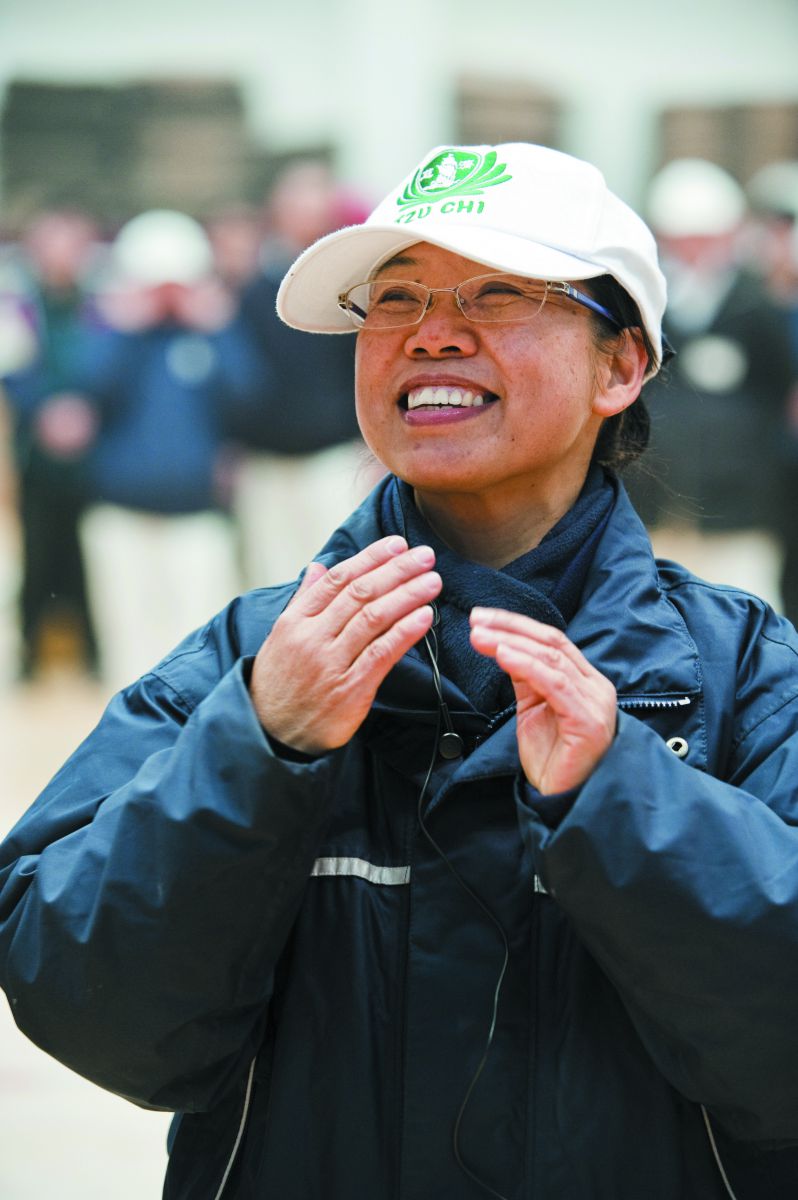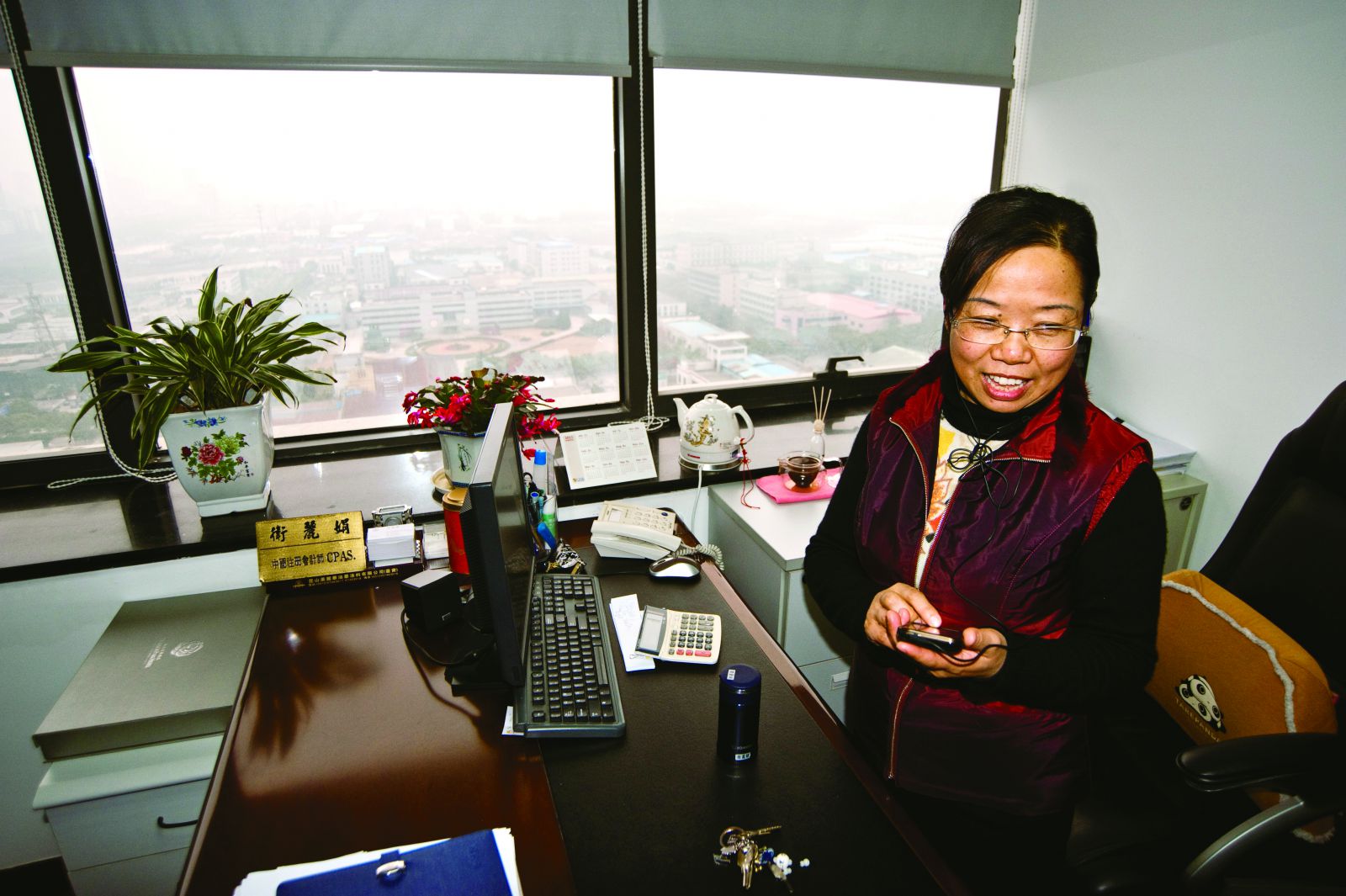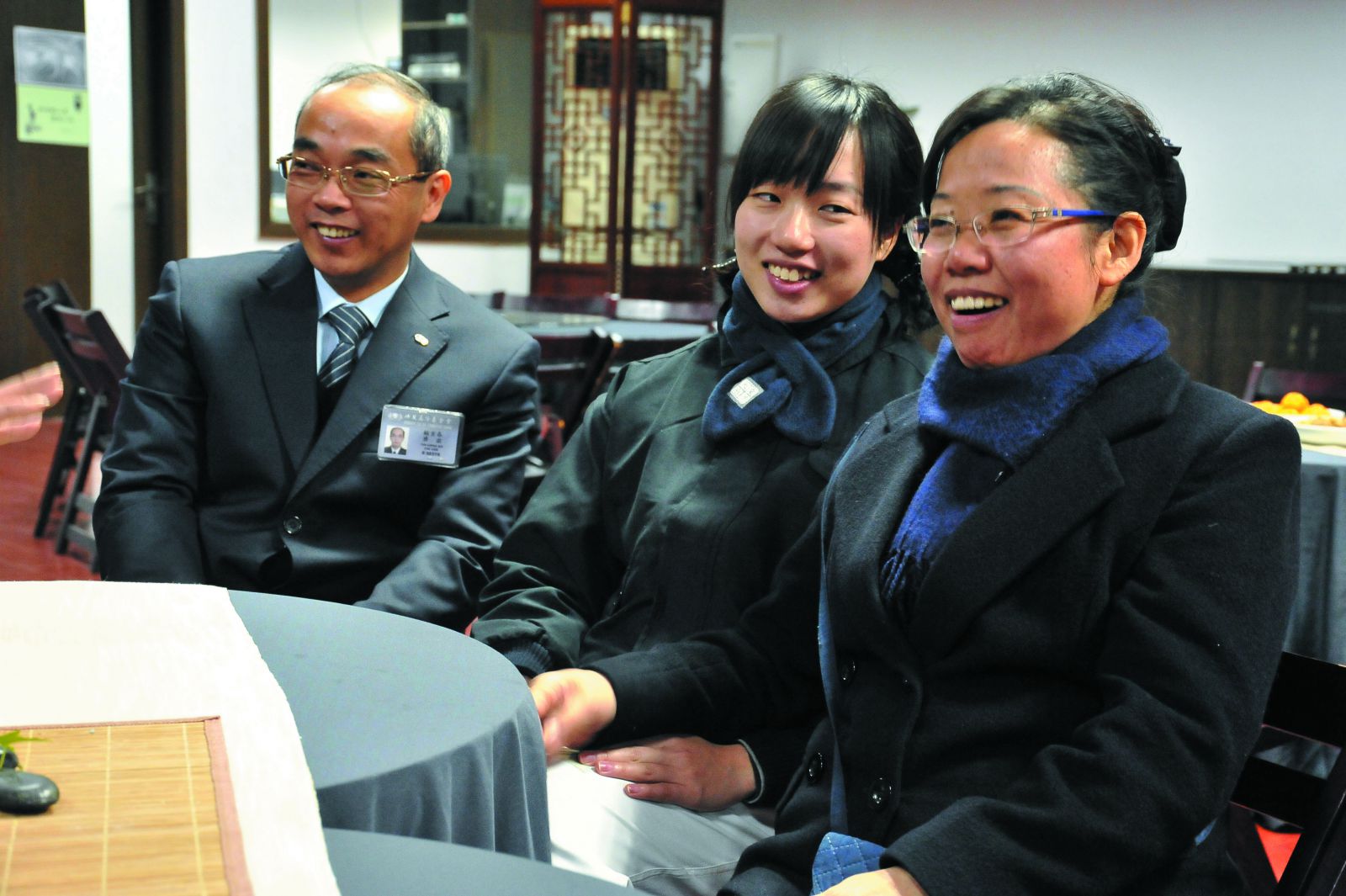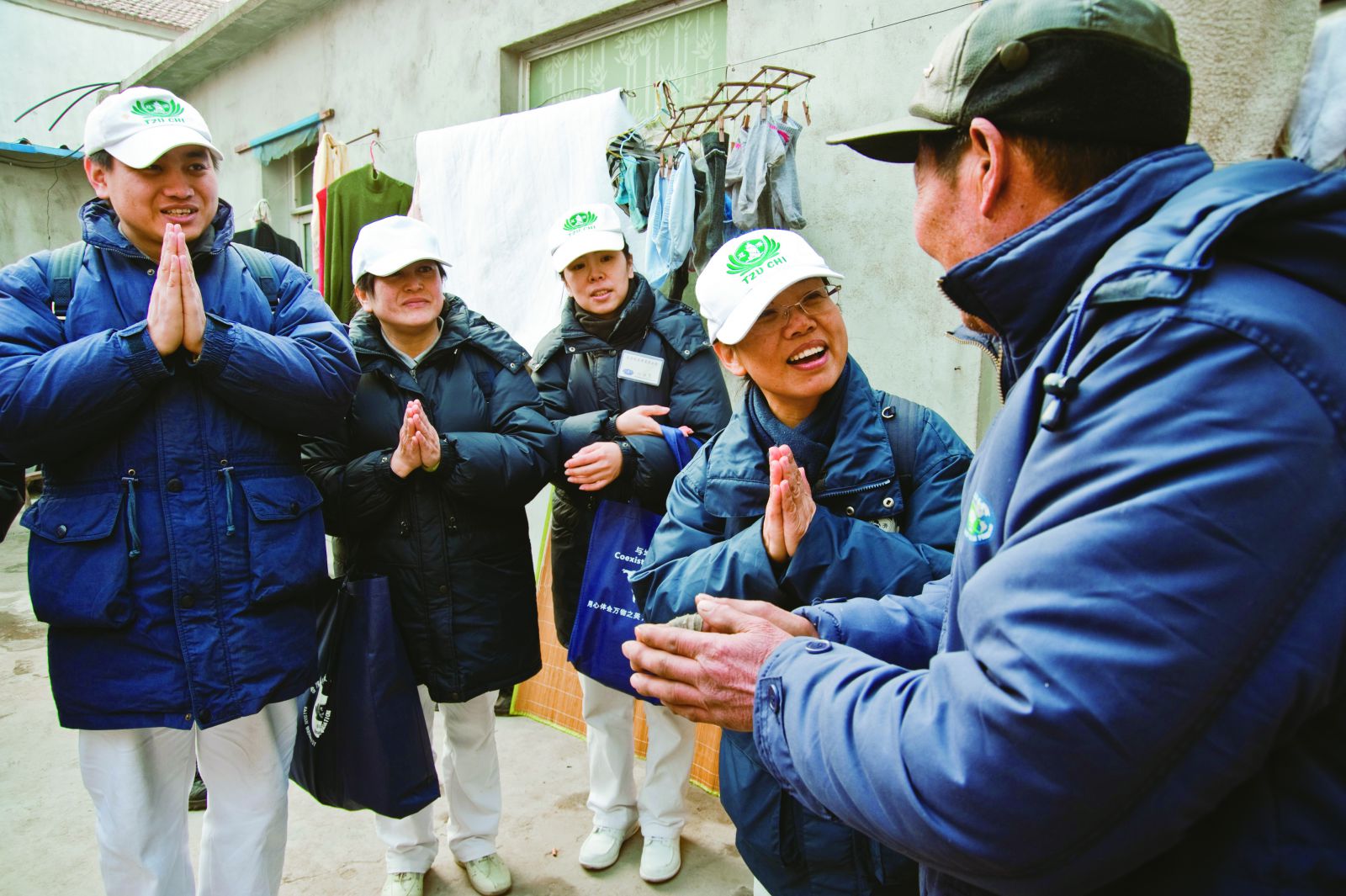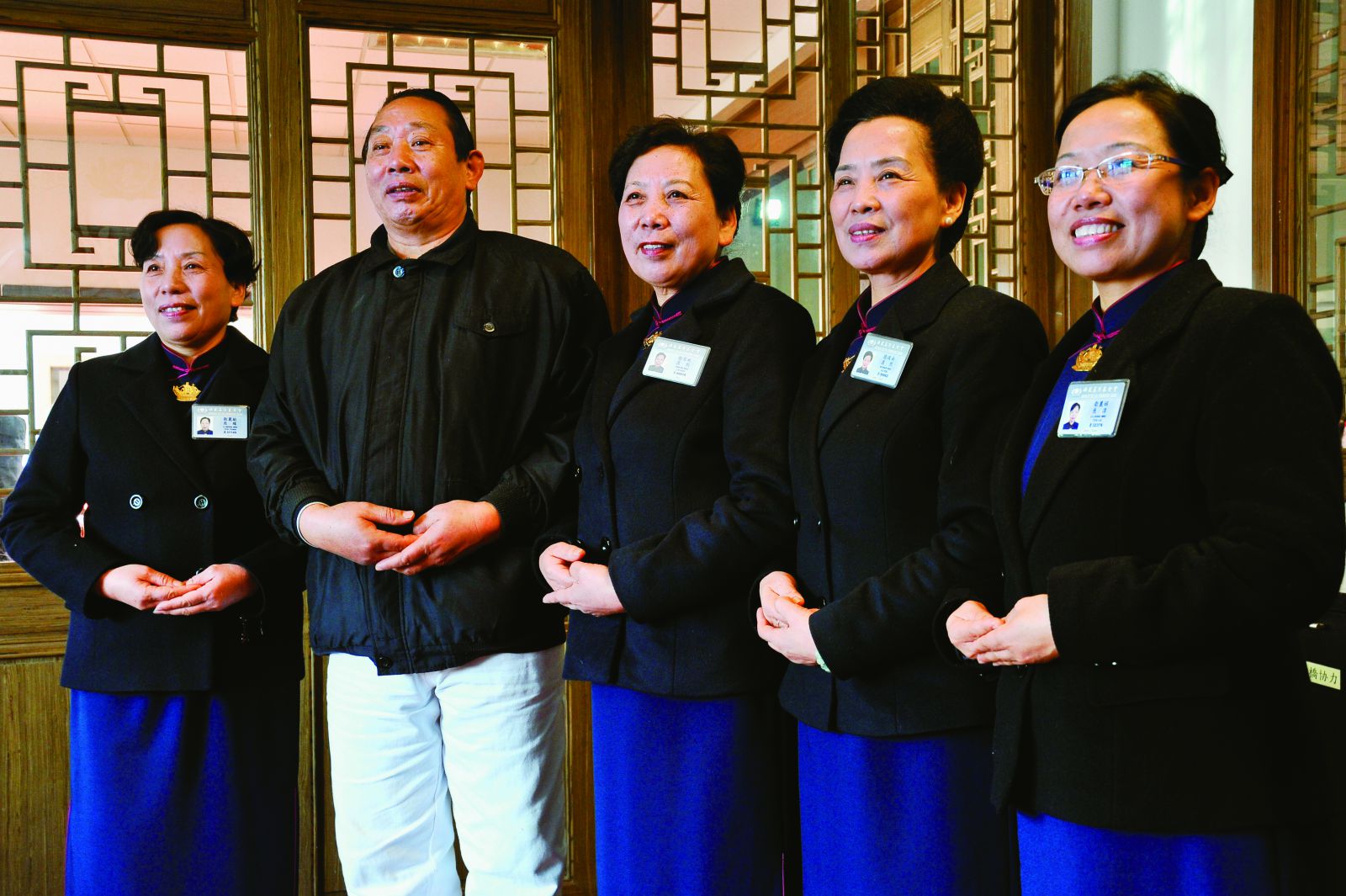

| In the Eyes of an Accountant: Is This Worth Doing? | ||||||||
| By Li Wei-huang Translated by Tang Yau-yang Photos by Huang Xiao-zhe | ||||||||
Wei Lijuan co-owns an accounting firm and is a pro in business analysis. She felt that it made no economic sense when she saw Tzu Chi volunteers take time away from their jobs to do volunteer work. It made even less sense when she learned that these volunteers paid their own expenses. According to her analytical, cost-benefit way of thinking, the volunteers were violating all the known economic principles on the books. Wei even suspected that the volunteers had ulterior motives. However, her own subsequent volunteer work erased her doubts and suspicions and led her to find the value of life.
Wei Lijuan (衛麗娟) was born in 1962 in Kunshan, Suzhou, near Shanghai. She was the youngest of eight children in the family. Her father, Wei Yonggao (衛永杲), ran a rice shop and provided well for the family. Wei’s early childhood years were carefree. However, those blissful years ended abruptly when she was just five years old. In 1966, the Cultural Revolution began sweeping through China. Ensnarled in the turmoil, her father lost more than his job—he also lost his dignity. Like countless others around the country that the overzealous Red Guards picked on, he was often forced to march in public parades and had to endure unjust humiliation. He often contemplated suicide. Wei clearly remembers those difficult days. Her mother, Hong Shuying (洪樹瑛), worked, but brought home just over 20 yuan a month. The entire family would then try to live for the next 30 days on that meager amount. That was not much money to begin with, and divided among such a large family it was next to nothing. It was virtually impossible for the family to go on like that in a large city, so her mother decided to move the family from Kunshan to a rural area, where the Weis received a house to live in from the government as part of a public policy to relocate people like them to the countryside. The sudden fall in the family fortune was hard on Wei, not so much because of the ensuing austerity, but for other factors. For example, one day she told her friends that she had had won-tons for dinner at home the night before. Little did Wei realize that her innocent remark—and to her own good friends, no less—would cause her father to be criticized in public the very next day for “indulging in the luxury of wontons.” “After that, I never told others what was really on my mind,” she said. Instinctively, she built a protective wall around herself. She was always on guard in her dealings with others. She no longer easily trusted anyone, with the exception of her own family. The family moved back to Kunshan when the Cultural Revolution ended in 1976. Her father started working again, this time in a job that the government arranged. “We all worked hard to earn others’ respect,” Wei said. “Dad told me that studying would be the only way for me to get ahead in life.” Though still a youngster, she took that advice seriously. At the same time that her contemporaries were taking it easy and having fun, she was poring over books and striving for good grades. China started giving nationally administered tests for certified public accountants in 1991. Wei passed it in 1993 and became one of the earliest CPAs in the nation. She continued to work very hard when she entered the accounting field. “I hoped to perform better than all my peers, and I wanted the best reputation, too. I wanted to gain others’ respect,” she said of her earliest days in the profession. She was an expert in analysis; she was efficient, rational and, due to her experiences in her youth, on guard. That’s why she was quite puzzled when she was first exposed to Tzu Chi. When she heard Tzu Chi volunteers express their gratitude at every turn, she wondered, “What’s there to be thankful for?” She was likewise befuddled when she learned that volunteers used their own time and paid their own travel expenses to take part in disaster relief missions. “I didn’t even have the time to do all the work in the office [much less to volunteer], and you expected me to pay out of my own pocket?” Wei also doubted the Tzu Chi philosophy of “giving without asking for anything in return.” She thought to herself, “What’s their hidden agenda? What do they really want?” Thinking back on those doubts and suspicions in the early days, she said, “It was like I was walking out from a dark room. When I first saw this sunny world [of Tzu Chi], I had to squint because of the bright light.”
Work first Wei was a workaholic at the time. Her whole world, the focus of her life, was work. Her work came first and foremost and her family came second. Nothing else came after that. She used to work 360 days a year, and she was busy all the time. She never had a moment to waste. “I went to my appointments promptly and left as soon as the business was concluded so I could rush off to the next client.” However, despite her efficiency, she often would not get home until ten at night. As a result, her husband, Gu Yinchun (顧寅春), usually had to cook dinner after he got off work. He even had to take their only child, Weiwen (顧蔚雯), shopping for her clothes. Wei was convinced that there was no better way for her to love her family than to provide well for them, so she worked exceedingly hard to that end. And she succeeded in being a good provider for her family, as she wanted. But her business success cost her and her family in other ways. For example, she was so busy succeeding in work that she neglected to be a friend to her own daughter. She simply demanded Weiwen do exactly what she told her to do. There was little room for any discussion of daily matters, much less for serious heart-to-heart conversations. As part of her work, Wei met Huang Rui-lan (黃瑞蘭), a businesswoman from Taiwan, for the first time in 2004. Huang’s family had experienced sad misfortune only half a year after they moved to Kunshan, and she was going through a great deal of stress. “At first, we only talked about work because I felt that she was kind of cold,” Wei recollected. “When she warmed up to me, I told her that I’d been worried that she wouldn’t be able to go on much longer. She confessed to me then that were it not for Tzu Chi volunteers, she wouldn’t have lasted that long.”
“What’s Tzu Chi?” Wei asked. Huang told her about the philosophy and work of the foundation, and she gave her a copy of Jing Si Aphorisms, a collection of maxims by Master Cheng Yen, the founder of Tzu Chi. “I opened the book, and one line caught my eye: ‘If you have a sharp tongue, then no matter how good your heart is, you are not a good person.’” Wei thought that was a dead-on description of herself. Huang invited Wei to Tzu Chi activities a few times, but Wei never went to any of them. In 2006, Huang told her once again about an upcoming event where volunteers would be making pastries for a charity sale. Wei promised to show up for a day, probably more as a favor to Huang than anything else. “I was cool to people,” Wei said, as she talked about her defensive self. “Usually I didn’t talk to people in the first five minutes after meeting them because I was gauging them.” Being the way she was, she was very unused to the warmth Tzu Chi volunteers showed her at the event. They called her “Sister Wei this” and “Sister Wei that,” which made her feel quite odd. Her hands, much more adroit and at home with pens than dough, got very tired after just one morning of ceaseless work. She decided to skip the afternoon part of her commitment. Just as she was ready to take off, she saw a poster about water cisterns that Tzu Chi had built in Gansu Province. By habit, she paid special attention to the numbers on the poster, such as the average unit cost of building a cistern and the number of cisterns built. As is always the case with Tzu Chi when it comes to money matters, the accounting of the project was immaculate. Likewise, ever the immaculate accountant, Wei easily ran the numbers through her mind, and she immediately spotted something that did not quite click. She asked a volunteer about the poster. “I notice that something is amiss with the accounting on the poster. Where are the remittance expenses? Didn’t Tzu Chi people go to the building sites? If so, where are the travel expenses? How come such expenses aren’t deducted [from the donations]? How could there be no administrative costs?” The volunteer told Wei that all Tzu Chi volunteers pay their own expenses. Wei was shocked by this revelation. “What kind of group is this? They’re a bunch of fools.” She could not make sense of their behavior.
A chance encounter At around that time, volunteers invited members of the Tzu Chi Collegiate Association to participate in a camp held for students in Guizhou who were either receiving tuition aid from Tzu Chi or attending schools the foundation had helped build. Wei registered her daughter, Weiwen, who was then waiting to start college. They only found out shortly before the trip that the parents of the youth were also required to attend the camp. After much hand-wringing and deliberation, Wei decided to accompany her daughter on the trip. She was for once willing to forgo her beloved work for the sake of her child—and for nine days, no less. At the camp, Wei was assigned to a group whose duties included preparing snack platters for the attendees. As she prepared the snacks, she tried to sneak in a few extra items on the platters for her daughter’s team. Other volunteers suggested that she refrain from doing so. They suggested that she regard all the children in the camp as equals, no matter what their background was or whether they came from Taiwan, Guizhou or Jiangsu. “Treat every one of the children as your own,” they said. She was humbled. “I learned much on that trip. I realized that I had been too narrow-minded.” After the camp, Wei signed up for one event after another, some of which lasted as long as seven days. “I wondered where I got the time to do all that.” However, even though she was taking more time off from work, the number of her clients only grew. In May 2008, a strong earthquake devastated Sichuan, China. The death toll was high, and many survivors badly needed help. For a time, all Wei could do was stare at images of their suffering on the TV screen and sob helplessly. Then Tzu Chi announced its plans to send volunteers to the disaster zone. Without hesitation, she signed up, packed up, and waited for the departure notice. Each volunteer team would go in for about seven days, then the next team would arrive to take its place. Wei had to wait a few turns before she set out. She was all ready to roll up her sleeves and help survivors clean up debris and garbage. However, when she got there, she found that her job was to help prepare hot food. This was not what she had anticipated, nor was it exactly her forte. She rarely cooked at home, so she knew precious little about even cutting vegetables, much less stir-frying and steaming them. Therefore, she ended up mostly washing vegetables and dishes. “I washed more dishes in those few days than I had in my whole life.” Many victims also helped with food preparation at the Tzu Chi hot food station. Wei discovered that volunteering had a therapeutic effect for these victims. “Volunteering got them out of their tents so they wouldn’t keep dwelling on their misery,” Wei observed. “Helping with hot food preparation, they were able to take their minds off the sadness of losing loved ones… at least for a time.” She also realized that that model of giving assistance could not be done by any individual alone. Only groups working in relay such as theirs could provide so much help. Two of the survivors whom Wei got to know during the mission used to go to temples every day to worship the gods and bodhisattvas. After seeing them serving at the hot food station for several days in a row, Wei asked them one day if they felt that they were neglecting their temple routine. “You guys are real-life bodhisattvas right here,” they replied, “so there’s no need for us to go to temples to seek out other deities.” Wei realized right then that bodhisattvas are not lifeless statues sitting on altars to which people bow and pray. Instead, they are real-life people doing what they can to help others in need. Wei visited Taiwan for the first time in 2009. When she saw Master Cheng Yen, she walked closer to her for a better look at the person whom she admired so much. But the closer she got, the blurrier the Master became: Wei’s tears were in the way. She could not help herself. Tzu Chi helped her find something that had long eluded her. She had missed many Chinese traditions that had been lost in the destructive Cultural Revolution, which started in 1966. But that same year, Tzu Chi was founded in Hualien, Taiwan. For many people, the foundation has restored or highlighted many Chinese traditional values. In the process of doing Tzu Chi work, Wei has found many of the things that she had been looking for, and she is gradually losing one thing that she acquired during the unpleasant revolutionary days: her suspicion of others. Many things in life cannot be analyzed according to the principles of accounting. There are things that can only be felt intuitively. For example, Wei has gradually come to understand why people are willing to volunteer at their own expense. Many people have come in contact with Tzu Chi during times of despair, but that was not Wei’s experience. She was well and doing well. She is thankful for being so blessed, so she feels that she should give more. Having seen the destruction of buildings and the eternal separation of loved ones in disaster zones, Wei understands that worldly possessions are not absolute, and that more important than wealth is the blessing that her family is together and healthy. Volunteering for Tzu Chi has helped her find bliss and contentment. She wanted others to share the same joy, so she has gotten her husband, siblings and nieces to also join Tzu Chi. Together, they enjoy the happiness of giving without expecting anything in return.
|
















|

